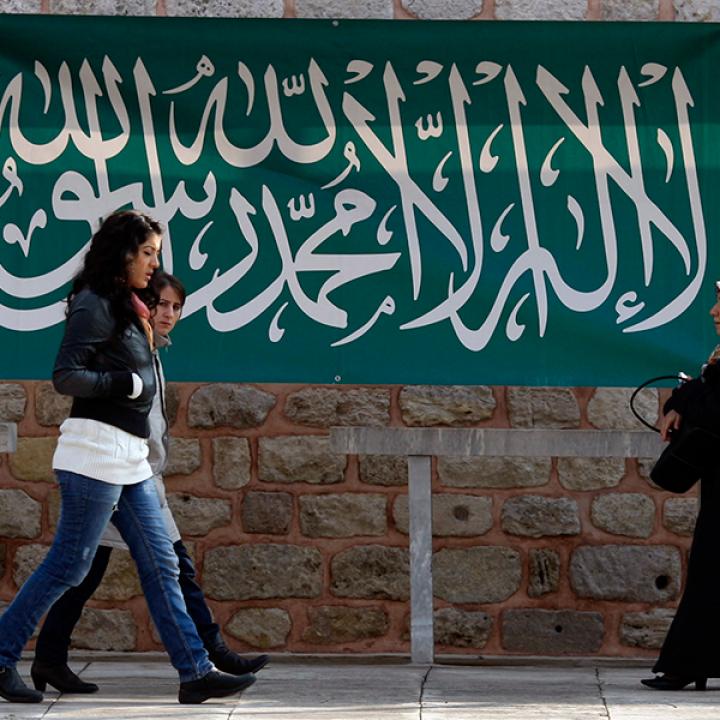

The rise of a middle class in Turkey has resulted in a society where rival political blocs and formerly violent factions are forced to coexist despite their enduring rancor.
Turkey has long been defined by political schisms. Recent tensions between the governing Justice and Development Party (AKP) and the Gulen movement have made the country appear once more to be teetering.
It is tempting to cast Turkey as yet another Middle Eastern country a la Egypt, paralyzed by bouts of undemocratic misrule and crisis. But Turkey will end up neither undemocratic nor in bloodshed. This country -- boasting the Middle East's largest economy, worth $1.4 trillion -- is too big to fail; it's so big that no one of its political factions can take it over in its entirety.
Take, for instance, the recent clash between Prime Minister Recep Tayyip Erdogan and the Gulen movement. On Jan. 7, Erdogan replaced police chiefs in the Turkish city of Izmir, suspecting them to be Gulenists conspiring against him by investigating him for corruption. However, Erdogan was startled when the new chiefs he appointed in their place launched their own graft probe days after taking office. Perhaps the new chiefs are indeed Gulenists. But they could as easily be liberals who despise Erdogan, or just law enforcement officials doing their job -- protecting the rule of law.
The lesson from Izmir is that Turkey is too big for any single person to control every lever of power. Not even a prime minister who has singlehandedly ruled the country for over a decade can fill every post with sympathetic bureaucrats.
Having become a majority middle-class society in 2010, Turkey has moved beyond the politics of violence. The country's Kurds, who had hitherto resorted to terror, have moved forward to embrace politics as the legitimate venue to seek their rights. Turkey's Kurdish insurgency is dying out. The rules of the game have been set; disputes will be resolved and political scores settled within their boundaries. Turkey's politics will resemble the Middle East's version of "Monopoly" rather than "Game of Thrones."
Even if the dynamics of Turkish politics bring to mind the politics of other Middle Eastern countries, Turkish politics will be different in style. Turkey will continue to have Islamists, in the various shades of this movement, as well as secularists and liberals and nationalists (of the Turkish and Kurdish persuasion) in its political game. And while these groups will play political hardball against each other, even getting quite nasty, in the end, people won't get hurt.
A major factor shaping this libertarian trend is the country's economic transformation over the past decade. Thanks to the sound economic policies of the AKP, Turkish incomes have more than doubled since the AKP came to power, and most Turks now live as comfortably as average southern Europeans.
Almost as soon as Turkey became a majority middle-class country, middle-class politics emerged. Millions of Turks took to the streets last year, for instance, in order to make some very middle-class demands: respect for the environment, urban space, and freedom of assembly and media. This was a shock for Erdogan. Known for strait-jacket conservatism, the AKP, until recently thought to have no rivals, appears to have created its own opposition: a growing liberal voice anchored in a rising middle class.
A similar balance also exists between the Islamists -- those who want to impose religion on every aspect of society -- and the secularists who don't want to see any religion in society. Polls suggest that both groups constitute only around 10-15 percent of the electorate, providing for what is a permanent but tolerable seesaw between religion and politics in Turkey.
Turkey's political system has also found a balance between Turkish and Kurdish nationalists. The Kurdish nationalists' abandonment of violence has muted the Turkish nationalist reaction to the emergence of Kurdish as a public language in Turkey.
The Kurds, long impoverished, are now benefitting from the spread of wealth across the country. Diyarbakir, the county's largest Kurdish city, and once famous for its urban poverty, now boasts nearly as many shopping malls per capita as the wealthier cites in the rest of Turkey. The arrival of consumerism and middle-class lifestyle among Turkey's Kurds has helped moderate their politics away from violence.
The rise of a middle class in Turkey has resulted in a society in which political blocs, though they still despise each other, are nevertheless forced to live side by side. This new Turkey will usher in the birth of a new Muslim-majority society: Libertarian by convenience, if not by its political nature.
Soner Cagaptay is the Beyer Family Fellow and director of the Turkish Research Program at The Washington Institute. His latest book is The Rise of Turkey: The Twenty-First Century's First Muslim Power (Potomac Books).
Hurriyet Daily News



